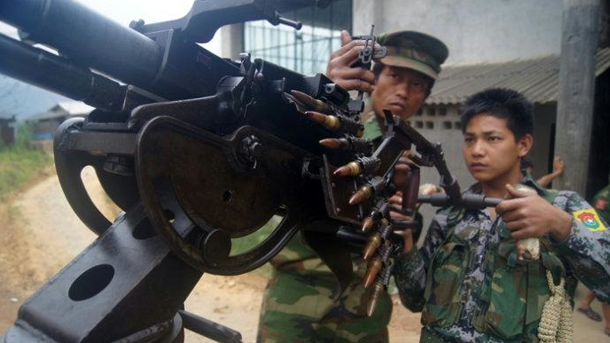Amid apparent attempts to arrange peace talks, the Burmese military is preparing for a large scale offensive against Kachin rebels in northern Burma with large troop deployments at the frontline, according to local sources.
La Nan, a spokesperson for the Kachin Independence Organization (KIO), said that Burmese government troops keep arriving by land and boats along the Irrawaddy River with an estimated 30,000 soldiers from battalions under Light Infantry Divisions 44, 77, 88 and 99 currently on the ground.
The road from Bhamo City to the KIO’s headquarter in Laiza, on the Sino-Burmese border, is also being inundated with government forces to protect military supplies and food shipments, according to La Nan. Similar security deployments can also be found along the road between Waingmaw and Kampati townships in southeastern Kachin State.
Despite KIO leaders writing to government peace negotiators in July to arrange another round of talks in Ruili, in China’s Yunnan Province, there has been no official response from Burmese officials so far, said La Nan.
Instead, “[The government] is sending more troops and military supplies. They have tripled their troops to protect against attacks by KIA [Kachin Independence Army] soldiers,” said La Nan. The KIA is the military wing of the KIO.
He also expected government troops to use armored units if fighting intensifies with ammunition for artillery and rocket launchers being transported to the conflict zone.
“Kachin State is in a risky situation,” said La Nan. “We can’t avoid war if they intend to wipe out us. We will try to cut their military supplies. We will launch attacks against their security forces using any means.”
Meanwhile, parliamentary debates have reportedly taken place between government peace negotiators and military officials over ceasefires with ethnic armed groups.
Sources from Naypyidaw said that Railways Minister Aung Min, the government’s chief negotiator, proposed accelerating the peace process.
However, Gen Soe Win, the deputy commander-in-chief of the Burmese armed forces, joined other military officials in objecting to Aung Min’s proposal by citing the hefty casualties suffered while fighting the KIA. Soe Win is also part of President Thein Sein’s peace committee.
Burmese Vice-President Sai Mauk Kham, an ethnic Shan, reportedly said that he also wants internal conflicts to be resolved as all ethnic rebels and government troops are citizens of Burma. Last week, Sai Mauk Kham also said that ceasefire agreements do not guarantee lasting peace and are always breakable.
According to KIO sources, Aung Min has informally agreed to hold a political dialogue with rebel leaders but the exact location remains a sticking point. Peace talks have been held repeatedly since early this year but no tangible agreement has been reached so far.
The KIO signed a ceasefire agreement with the Burmese government in 1994, but this truce broke down in June last year leading to more than 60,000 Kachin civilians being displaced to temporary camps by the Sino-Burmese border
The government’s Myanmar National Human Rights Commission recently visited Kachin State to witness the situation on the ground firsthand. A report released this week said that both KIA and government troops committed human rights abuses and called for an end to the war in northern Burma.
The rights body also said that child soldiers were being recruited by the KIA, but did not mention similar allegations made by the Kachin rebels about the Burmese military.

















